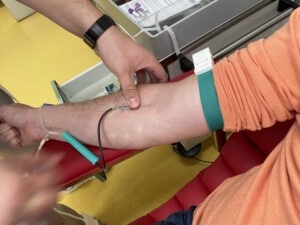
Prayer and spirituality can help ease depression and act as a cushion when life throws curve balls your way.
“Saying a small prayer to get through a difficult time is not unusual”. A plea for help from a higher power is one way people seek and find the benefits of spirituality, it provides a connection to something greater than yourself and offers more than just hope — it strengthens emotional health, too.
How Prayer and Spirituality Protects Emotional Health
There are challenges to studying the impact of prayer, notes psychologist Crystal Park, Ph.D., a psychology professor at the University of Connecticut
For example, people who pray often and are active with their faith communities might be making generally healthier decisions, such as taking fewer risks or avoiding smoking and drinking. It’s also possible that people are praying too erratically — in crises only, for example — for researchers to know just what effects it can have on well-being, Dr. Park says.
“That peace, that sense of meaning and connection that happens with prayer is what is positive,” Park says. “Those kinds of things have physiological effects on the body, such as calming your cardiovascular system and reducing your stress.”
There are several ways in which a regular spiritual practice may improve or protect your emotional health. It can:
Offer a bigger sense of purpose.
A connection to a greater power or truth can give you a sense of purpose and meaning beyond the day-to-day.
It provides social support.
Through practicing your spirituality, you may become involved with a community of like-minded people. An August 2015 review of 78 studies by Park and other researchers published in Cancer found that patients who reported a strong religious or spiritual life also maintained richer social connections.
Another example of the effect of social support with a spiritual connection comes from a study of older adults in Thailand. Those with active Buddhist networks were found to have better daily functioning, according to the study published in Geriatrics & Gerontology International.
Lift the spirit.
Activities related to your spiritual practice or community involvement, such as singing and music, may also have positive effects on emotional health. Participating in a choir offers a support system and may reduce anxiety and depression among cancer survivors and their caregivers, according to a recent study published in the journal of Ecancermedicalscience.
Help you cope with difficulties.
Spirituality or religion can provide a framework for dealing with unexpected or negative events. For example, regular church attendance and prayer appear to lessen the symptoms of depression when dealing with the death of a loved one, according to research published in 2012 in Depression Research and Treatment.
“I would recommend that if you have faith, rely on it,” Park says. “And if you don’t have a traditional faith, you can cultivate this by relying on other venues that provide that sense of connection, unity,
or feeling at peace.”
That might include being out in nature or practicing yoga or meditation. With all the possible positive benefits from prayer and faith life, she says, “we could, as a culture, be a little more supportive of people relying on those things.”
A Personal Tale of the Power of Prayer
The four cited benefits of spirituality have proven true for Tiffanie Lyon, vice president of operations for TEEM Academy and an associate pastor at First United Methodist Church in Slidell, Louisiana.
“My prayer life and relationship with God keep me grounded and give me a sense of peace, hope, and gratitude in my heart,” says Lyon, 48, whose days are spent juggling the demands of family, a full-time job, and her work as a pastor. “If one can’t look inside oneself and beyond oneself, there is a piece missing to complete the healthy self.”
Lyon traces her personal and professional journey through changes in her prayer life. When she first moved to Louisiana she was trying to rebuild a consulting business. She went through a series of five knee surgeries and took on debt trying to get her business off the ground, and this led her to dig deep into her prayer life.
“Prayer and spirituality are a big part of who I am, and I’m continuing to learn and grow in this area,” she says. “Prayer can give you a sense of peace in the midst of chaos.”
The difficult period of surgery and business struggle led to a change in perspective, she recalls. A friend suggested that she look into ministry, and she began a course of study so she could be a Methodist pastor near her home. She also turned her skills as a businesswoman and a speaker into a job with TEEM Academy, where she and her team match workers with mental or physical disabilities to employers.
The prayer life she nurtured to get through her own tough times has expanded to include prayer for her loved ones and her congregants. “Just recently, my father was diagnosed with treatable stage III lung cancer,” she says. “I’m praying for him and working with him [spiritually].” Lyon says she has a small altar in her room where she prays, often asking for “peace, wisdom, and guidance.” But, she says, she has also learned how to listen even as she prays.
The Health Benefits of Prayer Are Real
Researchers have linked regular spiritual practice with various health benefits, including preventing depression. For example:
A report published in Health Psychology found that when researchers followed 191 people with congestive heart failure for five years, they found that those who reported feeling spiritual peace — and who also made some healthy lifestyle changes — were significantly more likely to live longer than their peers. People with major depressive disorder or chronic medical illness who report high levels of religiosity, which includes daily religious experiences, generally become more optimistic than their peers, found a study published in Depression and Anxiety. Weekly attendance at a religious service, praying often, and reading religious books all appear to prevent recovering substance abusers from relapsing and again using cocaine, heroin, marijuana, or alcohol, according to research published in June 2015 in the Journal of Reward Deficiency Syndrome.
When Prayers Go ‘Unanswered’
Despite prayer’s positive benefits, there are limits to its power. Serious health problems, such as depression and diabetes, require medical attention. Anyone who has severe depression or another serious medical condition should seek care from a doctor.
Still, for many people, spirituality plays a key role in coping with whatever life throws your way.
In her own life and work as a pastor, Lyon says she has often seen people struggle with prayers that aren’t answered as desired.
“We won’t have answers to those questions this side of heaven,” she says. “But as long as we know that there is a God, and a God who is walking with us, doing all things for good in the long run, it can help you be a little more centered.”





































